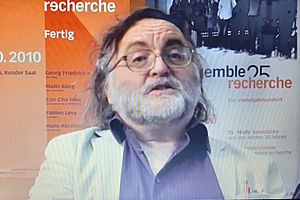Brian Ferneyhough facts for kids
Quick facts for kids
Brian Ferneyhough
|
|
|---|---|
 |
|
| Born | 16 January 1943 (age 83) |
| Occupation | |
Brian John Peter Ferneyhough (born January 16, 1943) is a famous English composer. He is known as a key person in a style of music called the New Complexity movement. This type of music often sounds very detailed and complex.
Brian Ferneyhough has taught music composition at several universities. These include the Hochschule für Musik Freiburg and the University of California, San Diego. He currently teaches at Stanford University and often gives talks at the Darmstädter Ferienkurse summer courses. He has lived in California since 1987.
Contents
Brian Ferneyhough's Early Life and Education
Brian Ferneyhough was born in Coventry, England. He started his formal music training at the Birmingham School of Music. Later, from 1966 to 1967, he studied at the Royal Academy of Music. There, he learned from a teacher named Lennox Berkeley.
In 1968, Brian won the Mendelssohn Scholarship. This award allowed him to move to Europe to continue his studies. He first studied with Ton de Leeuw in Amsterdam. After that, he learned from Klaus Huber in Basel.
Teaching Career and Influence
From 1973 to 1986, Brian Ferneyhough taught composition at the Hochschule für Musik Freiburg in Germany. Many of his students became well-known composers themselves. Some of them include Kaija Saariaho and Toshio Hosokawa.
Later, from 1987 to 1999, he was a Professor of Music at the University of California, San Diego. In 2000, he became the William H. Bonsall Professor in Music at Stanford University. He was also a visiting professor at Harvard University for the 2007–08 school year.
Brian Ferneyhough has also given many lectures on composition. He taught at the Darmstädter Ferienkurse from 1978 to 1994. Since 1990, he has led a special masterclass each year in France.
Awards and Recognition
Brian Ferneyhough has received many important awards for his music. In 1984, he was given the title Chevalier de l'Ordre des Arts et des Lettres. This is a special honor from France.
In 2007, he received the Ernst von Siemens Music Prize. This award is given for a lifetime of great achievements in music. In 2009, he became a foreign member of the Royal Swedish Academy of Music.
He also received honorary degrees from universities in London and Birmingham. These degrees recognized his important contributions to modern classical music.
Brian Ferneyhough's Unique Musical Style
When Brian Ferneyhough first started composing, his music was not always understood in England. However, he found support from people who believed in his talent. A big moment for his career was the Royan Festival in 1974.
At this festival, his piece Cassandra's Dream Song for solo flute was performed for the first time. Also, his work Missa Brevis for 12 singers was premiered. In 1975, his pieces Transit and Time and Motion Study III were performed. Transit even won a Koussevitzky Prize.
What is New Complexity Music?
Brian Ferneyhough is often called the "Father of New Complexity." This style of music is known for being very detailed and challenging. It often uses many notes and complex rhythms.
However, Brian Ferneyhough does not just follow strict rules when he composes. He uses systems to help him create musical ideas and structures. But the actual music often comes from his own creative choices.
He wants his music to make listeners think differently about how they hear sounds. He creates musical moments that are full of their own complexity. This makes the listener pay close attention to every detail.
Performers of Ferneyhough's Music
Brian Ferneyhough's music is very difficult to play. It requires great skill from the musicians. Despite this, many talented performers enjoy playing his works.
Some famous groups and musicians who perform his music include the Arditti Quartet and the ELISION Ensemble. These performers help bring his complex musical ideas to life.
Brian Ferneyhough's Opera: Shadowtime
Brian Ferneyhough also wrote an opera called Shadowtime. An opera is a play where most of the words are sung. The story of Shadowtime is about the life of a German philosopher named Walter Benjamin.
The opera was first performed in Munich on May 25, 2004. Like many of his works, it received different opinions from critics.
Selected Works by Brian Ferneyhough
Brian Ferneyhough has written many pieces of music. Here are some of his important works:
Works for String Quartet
- First String Quartet (1963)
- Sonatas for String Quartet (1967)
- Second String Quartet (1980)
- Third String Quartet (1987)
- Fifth String Quartet (2006)
- Sixth String Quartet (2010)
Selected Solo Works
- Cassandra's Dream Song for flute (1970–71)
- Time and Motion Study I for bass clarinet (1971–77)
- Unity Capsule for solo flute (1976)
- Lemma-Icon-Epigram for piano (1982)
- Bone Alphabet for percussion (1991)
- Unsichtbare Farben for violin (1999)
- Sisyphus Redux for alto flute (2009)
For Non-Orchestral Ensemble
- Transit for solo voices and ensemble (1972–75)
- Time and Motion Study III for sixteen solo voices, percussion and electronics (1974)
- Carceri d'Invenzione I for a group of instruments (1982)
- La Chute d’Icare for solo clarinet and chamber ensemble (1988)
- Terrain for violin and chamber ensemble (1992)
- The Doctrine of Similarity for chorus and instruments (2000)
For Orchestra
- Firecycle Beta for two pianos and two orchestras (1969-1971)
- La Terre est un Homme for orchestra (1979)
- Plötzlichkeit for large orchestra (2006)
Opera
- Shadowtime (1999–2004)
See also
 In Spanish: Brian Ferneyhough para niños
In Spanish: Brian Ferneyhough para niños
 | Delilah Pierce |
 | Gordon Parks |
 | Augusta Savage |
 | Charles Ethan Porter |

